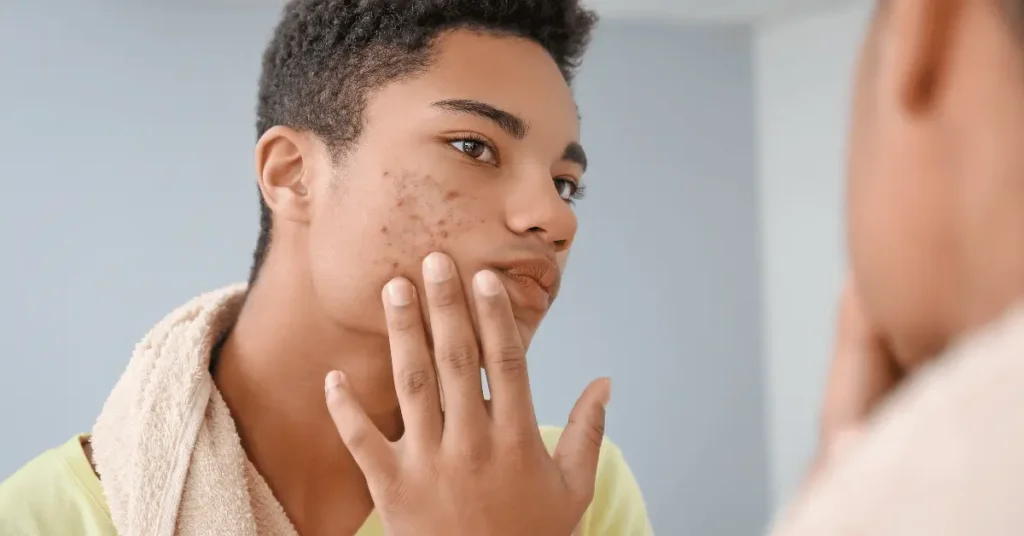The Old Foe
A radiant complexion isn’t just about aesthetics; it’s a testament to good health and hygiene. Acne—a skin condition that afflicts nearly 85% of the population globally at some point in their lives—can negatively impact not only the skin’s appearance but also the individual’s self-confidence. Acne goes beyond superficial skin blemishes; it can influence overall well-being and mental health. Today, let’s demystify the old foe that is acne and provide a comprehensive guide to effective treatments and strategies for maintaining gorgeous skin.
Understanding Acne
Acne isn’t a death sentence. It’s a skin condition when hair follicles become clogged with oil and dead skin cells. It’s characterised by blackheads, whiteheads, pimples, and deeper lumps (cysts or nodules). These blemishes typically appear on the face, neck, chest, back, shoulders, and upper arms—where oil glands are most prominent.
Various factors contribute to acne development, including hormonal changes, diet, stress, certain medications, and a genetic predisposition. Acne also varies in severity, from mild (whiteheads and blackheads) to more severe forms (papules, pustules, nodules, and cysts). Understanding your acne type can lead to more effective treatment strategies.
Prevention & Daily Skincare Routine
Consistent skin care is pivotal in managing acne. A routine emphasising cleansing, exfoliating, and moisturising can make a difference. Start by washing your face twice daily with a mild cleanser to remove dirt and excess oil. Exfoliate once or twice a week to remove dead skin cells that clog pores, but avoid aggressive scrubbing, as this can irritate the skin and exacerbate acne.
Invest in products with salicylic acid, benzoyl peroxide, and retinoids, which can prevent and treat acne. Daily habits like avoiding touching your face, regularly cleaning your phone screen, and changing pillowcases can also help prevent breakouts.
Over-the-counter (OTC) Acne Treatments
OTC acne treatments can be an excellent first line of defence. Products with benzoyl peroxide help kill acne-causing bacteria and remove excess oil and dead skin cells. Salicylic acid, a common acne ingredient, unclogs pores, reducing swelling and redness.
Sulfur-based treatments can help by drying the skin surface and absorbing excess oil, reducing inflammation. Remember, OTC treatments can cause dryness and irritation, especially at the beginning of use, so start with lower strengths and gradually increase as your skin adjusts.
Prescription Medications for Acne
If OTC treatments aren’t effective, prescription medications can offer a solution. Retinoids, derived from vitamin A, promote skin cell turnover and prevent hair follicle clogging. Oral antibiotics can be used to reduce bacteria and fight inflammation.
In specific cases, hormonal treatments like oral contraceptives may be prescribed to balance hormones that cause acne. These medications can have side effects, so discussing them with your healthcare provider before starting a new drug is important.
Advanced Acne Treatments
Advanced treatments like chemical peels, laser and light therapies, and micro-needling can effectively treat stubborn acne and acne scars. Chemical peels remove the outer layer of your skin, promoting new skin growth less affected by acne.
Laser and light therapies reduce the acne-causing bacteria in your skin and decrease oil production. Micro-needling, on the other hand, promotes skin regeneration and reduces the appearance of acne scars. These treatments should always be performed under professional guidance due to potential side effects and post-treatment care.
Lifestyle Factors & Acne Management
Your lifestyle significantly influences acne. A healthy diet and hydration can help balance your body’s natural oil production. Stress management techniques like meditation or yoga can mitigate stress-induced acne flare-ups. Regular exercise boosts blood circulation, nourishing skin cells and promoting skin health. Furthermore, quality sleep helps rejuvenate your skin and prevent breakouts.
Seeking Professional Help
If acne persists despite your efforts, consult a dermatologist. They can provide personalised treatment plans, combining different approaches for optimal results. Professional help can be instrumental in treating severe acne, preventing scarring, and addressing the emotional distress often associated with this skin condition.
For fantastic professional help, Skin NV, a unique Skin and Hair Clinic in London, offers a range of personalised acne treatments under an experienced aesthetic doctor’s guidance and many other lifestyle-enhancing treatments.
The Sum of It
While acne is a common skin issue, it doesn’t need to dictate your life or confidence. You can significantly improve your skin’s condition by understanding acne, following a consistent skincare routine, utilising appropriate treatments, and leading a healthy lifestyle. Remember, each person’s skin is unique, and what works for one might not work for another. Take the time to understand your skin, and don’t hesitate to seek professional help. Your journey to clear skin starts with a single proactive step.


